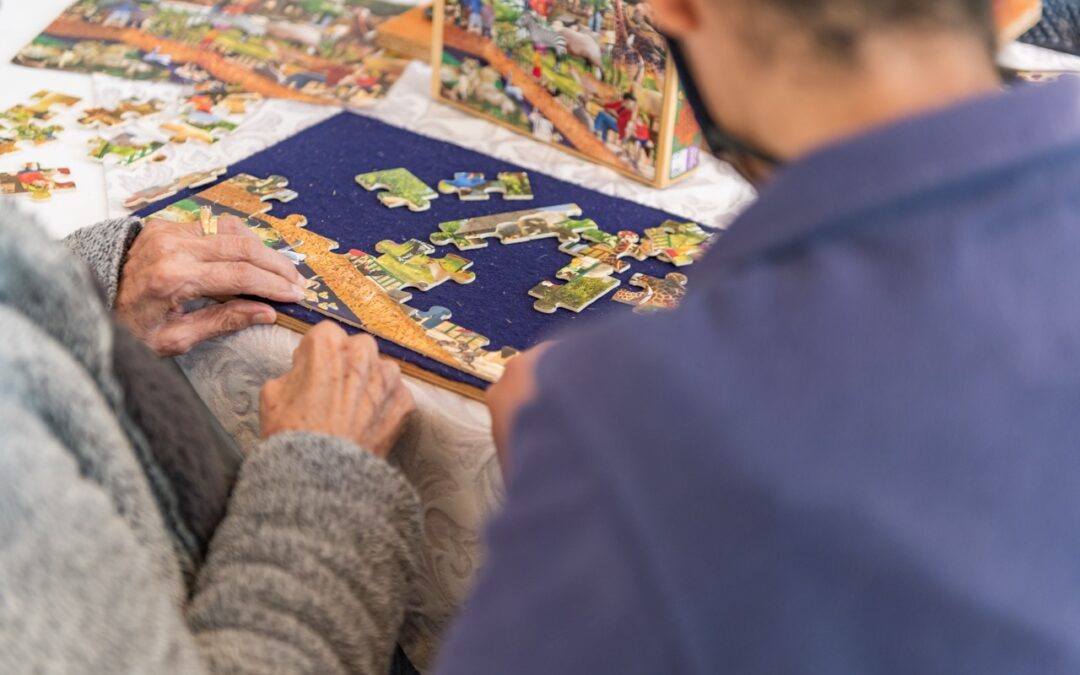While dementia, a syndrome associated with a decline in memory and or other thinking skills, can be challenging for all involved including caregivers, there is a great deal that can be done to support and stimulate people living with dementia. At Livewell we provide different stimulating dementia care activities designed to meet the individual needs of our residents, these include music and crafts, sports, board games, and outings, to both stimulate and engage with our residents. It’s also incredibly important for us that these memory care activities also support their cognitive function.
Among the various memory care activities available, puzzles stand out as an effective tool for stimulating the brain and helping to maintain cognitive abilities in people with dementia. From jigsaw puzzles to word games, these activities not only provide our residents with entertainment but also offer significant cognitive benefits backed by research.
The science behind puzzles and cognitive stimulation
Puzzles are more than just a way to pass the time. They require active engagement from the brain, making them a powerful form of cognitive stimulation. When someone works on a puzzle, different parts of the brain are activated, which can help improve memory, problem-solving skills, and overall cognitive function. Here’s a closer look at how puzzles benefit the brain:
- Activation of multiple brain regions: Completing a puzzle involves a range of cognitive processes that activate various brain regions simultaneously. For example, jigsaw puzzles require visual-spatial reasoning, where the brain must recognise shapes, colours, and patterns and figure out how they fit together. Crossword puzzles, on the other hand, engage language processing areas of the brain as well as memory retrieval systems to recall words and phrases. These activities challenge the brain and keep it active, which is crucial in dementia care.
- Enhancing neuroplasticity: Neuroplasticity refers to the brain’s ability to reorganise itself by forming new neural connections. Engaging in puzzles encourages neuroplasticity by stimulating new pathways in the brain, which can help delay the progression of cognitive decline. Research shows that regular mental exercises, like puzzle-solving, can help keep the brain flexible and capable of adapting to the challenges of dementia.
- Memory retention and recall: Puzzles, particularly those that involve words or numbers, require memory recall and retention. For people with dementia, this can be a valuable exercise. Memory care activities like crossword puzzles or matching games encourage the retrieval of information stored in long-term memory. This practice helps reinforce memory retention and can improve the ability to recall information in day-to-day life.
- Reduction of cognitive decline: Studies have found that engaging in mentally stimulating activities, such as puzzles, can help slow cognitive decline in individuals with dementia. According to research published in the Journal of Geriatric Psychiatry and Neurology, older adults who participate in cognitive activities like puzzles experience slower rates of memory decline compared to those who do not. Regular participation in these activities helps keep the brain active and may contribute to better cognitive health over time.
- Stress reduction and emotional well-being: Beyond cognitive benefits, puzzles also offer emotional and psychological advantages. Engaging in puzzle-solving can reduce stress and provide a sense of accomplishment. This is especially important for individuals with dementia, as they often face feelings of frustration and anxiety due to their condition. Participating in familiar and enjoyable dementia care activities like puzzles can create a calming effect, improving overall emotional well-being.
The role of puzzles in memory care activities at Livewell
At Livewell, we understand the importance of offering diverse memory care activities that cater to the individual needs of our residents. Puzzles are a staple in our memory care programs because they provide a simple yet effective way to keep the mind engaged while promoting relaxation and enjoyment. Our residents participate in a variety of puzzle activities, from large-piece jigsaw puzzles designed for easier handling to word games that stimulate memory and cognitive function.
By incorporating puzzles into our dementia care activities, we aim to create an environment where cognitive stimulation is seamlessly integrated into daily life. We have seen firsthand how these activities bring joy to our residents while supporting their cognitive health. Puzzles offer a sense of purpose and accomplishment, helping to maintain a higher quality of life for individuals living with dementia.
Learn more about our personalised memory care activities included in our dementia care offering here.
